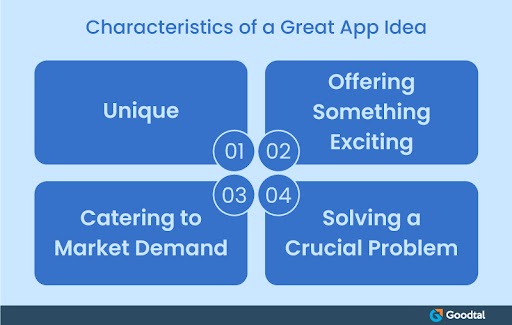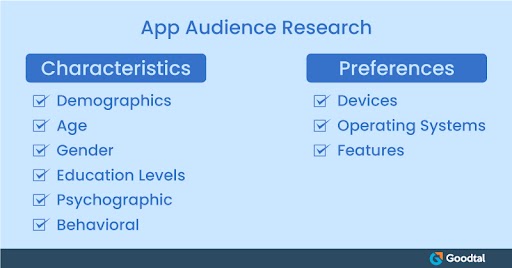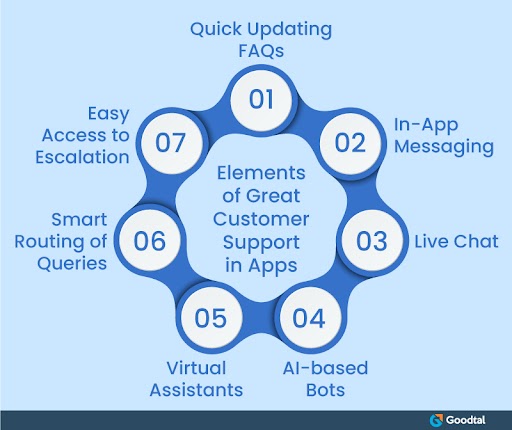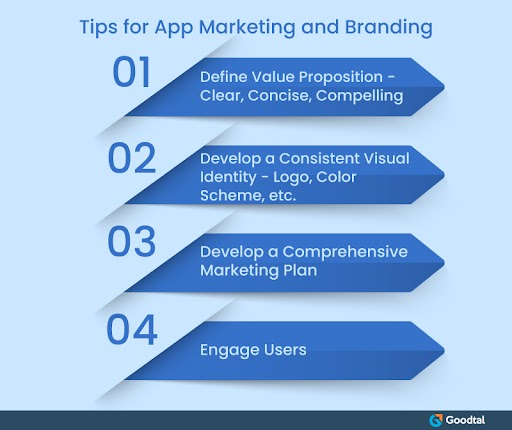
Most businesses are going for mobile app development to take their business growth to a higher level. However, not all apps will survive in the competitive market, as users cannot download thousands of apps or use so many apps daily. The users select the apps that cater to their needs in the least time-consuming and most fulfilling manner.
Have you ever wondered how some businesses develop such apps that the users choose and use over their competitors' apps? Read further to know!
Idea
Apps developed by the best mobile app development companies can also fail if you don’t start with a great idea! The first and the most crucial step to success in app development is actually before development! You must start with a great idea. Old and outdated ideas will only waste your time and resources and will not give you any market advantage.

But how do you find a great app idea? Well, this requires comprehensive market research.
Market Research
Before starting app development, market research helps identify industry trends and needs. Market research before app development includes assessing the demand. For example, these days, doorstep delivery services are in demand. However, just because doorstep delivery services are in demand, you can't develop another app for the same services without assessing the existing supply or, let's say, the existing competition in this area.
We can assume that there are going to be competitors for a majority of ideas. So, we must develop an app for an idea after researching what the existing competitors lack! Browsing their reviews and customer feedback will also suggest their pros and limitations. Then, you must also research your audience!
Audience Research
While assessing the market demand and competition for your app idea, it is essential to do some target userbase research regarding demographics, gender, age, etc. This is because different types of users have different preferences for operating systems and devices, and you must know what OS or devices to develop for.
Many businesses choose cross-platform development if they want to develop for different OS or devices without spending separately on development for each. However, some businesses go for iOS app development and Android app development separately to leverage the best tools and technologies for the specific domains and deliver audience-specific apps for each OS preference.

RoI
As we all know, app development is costly, especially if we plan to develop an innovative idea that hasn't been covered already. So, we must plan the costs before development starts and budget accordingly. Estimating app costs, calculating expected profits, and approximate break-even times help businesses decide the budget and feasibility of developing the idea.
Constraints
Market research is more challenging than it sounds. As discussed above, if we develop an existing idea, we face tough competition. While if we start with an out-of-the-box idea, we are taking a huge risk!
Market research has its limitations. It is costly and time-consuming, and yet the conclusion is risky if we have not spent enough time and resources to get the best possible data. Moreover, if the research takes too long, market demands can change, making the whole effort fruitless!
Another constraint in market research is that many businesses work with minimal funds. Unless the app idea is extraordinary and expected to fetch huge gains, it is not easy to find investors.
Cutting-edge Technology Integration
Several apps are in the app stores, many for the same purpose and having almost similar features and functionality. In such a situation, an app to be successful requires some distinction. To make an app that is different from its peers, we must integrate the latest technology. If you do not incorporate technology to your advantage, your competitors will!
Augmented Reality
Cutting-edge technology adds that extra to the app, attracting users. For example, there have been e-commerce players existing for decades now. But, in the last few years, more and more e-commerce businesses are opting for Augmented Reality based real-like experiences for users that make the online purchasing experience even more exciting and trustworthy than the in-store experience.
Travel apps that used to suggest travel destinations and plan tours for customers now offer virtual travel experiences to help users get a real-like glimpse of a remote destination before visiting it. Educational apps also offer high-quality remote education globally with such technological advancements.
Suggested Reading: 10 Must-Have Features of an Education Mobile Application
Technology is adding virtual experiences that are more exciting than the real. So such apps are preferred by users who embrace technology readily and expect something new and different.
Artificial Intelligence & Machine Learning
In the above example of ecommerce apps, it is not enough to offer virtual product trials if the customer doesn't like the product after the trial and quits your app. How about suggesting substitute products based on what the customer liked or disliked in the product he chose to try?
You can prevent abandonment by recommending another product! But, the recommendation must match the customer’s preference for a successful sale. In brick-and-mortar stores, there are showcases, and salespeople help people find another product if they don't like the one they choose for trial. Can’t we offer such facilities virtually?
We obviously can offer product suggestions even without the intervention of human support. Artificial Intelligence and Machine Learning assess customer behavior to interpret likes and dislikes. Then products that match the customer’s liking are suggested to the customer so that he always has something more to try and choose from.
AI and ML allow comprehensive personalization, data analysis, and even decision-making capabilities for the app.
Suggested Reading: Emerging Role of Business Intelligence in Mobile Apps
Personalized UI/UX
The first step to creating a personalized user experience in the mobile app is to collect user data and preferences. This involves recording information such as demographic data, interests, hobbies, and users’ app behavior.
The best way to collect user data is through surveys, feedback forms, or tracking user behavior from the app using specialized tools and technologies. Intelligent Machine Learning algorithms help analyze user data and behavior. Based on this data, the app can make intelligent recommendations.
Similarly, user behavior can be tracked and analyzed in real-time to offer push notifications to the user. For example, if the user browses the menu often and seems like he is searching for something and then quits when unable to find it, the app can prompt a support bot asking the user if he needs help with some feature in the app.
Allowing users to customize the app settings will enable businesses to gather so much about the user, apart from allowing a personalized experience. They should be allowed to choose the color scheme or set up personalized notifications. They should also be allowed to select the content that they would like to see. You learn what the user needs and prefers through his behavior while using the app.
Customer Support is a crucial aspect of user experience. The infographic here lists elements of a great customer support experience.

Branding & Marketing
Strong branding and marketing are essential for the success of your app. You must also promote your app effectively to set it apart from competitors. These measures help you attract more users and increase the app’s visibility and popularity.

Comprehensive Marketing Plan
To ensure your app is promoted well and reaches your target audience, your marketing plan should be the right mix of marketing tactics and channels, including social media, content, influencers, etc. The efforts should continue beyond planning. Businesses must track and optimize their marketing activities to derive the most out of their efforts. This includes evaluation of what is working and what needs rework or revamping.
Engage Your Users
Engaging is the best way to earn loyalty from your users. Through the apps, businesses must engage with their users and build a community. Conducting promotional campaigns like contests and polls is an excellent way to engage many people. Never avoid responding to their feedback, even if it is negative.
Wrapping Up!
There are numerous apps in the stores for different purposes. Also, there are multiple for almost the same purpose. So, though it might be easy to develop an app, it is complicated to offer an app that beats the competition and achieves success in so much competition. So, businesses should select mobile app developers with caution and go for the best.
Also, considering that mobile app development is a vast area, select a development partner with expertise in the specific domain if you want exceptional outcomes. For example, if you want your app developed on Flutter, specifically go for the best Flutter app development companies.
Goodtal’s lists make your search for the top mobile app development services easy; don’t miss to check it out!
